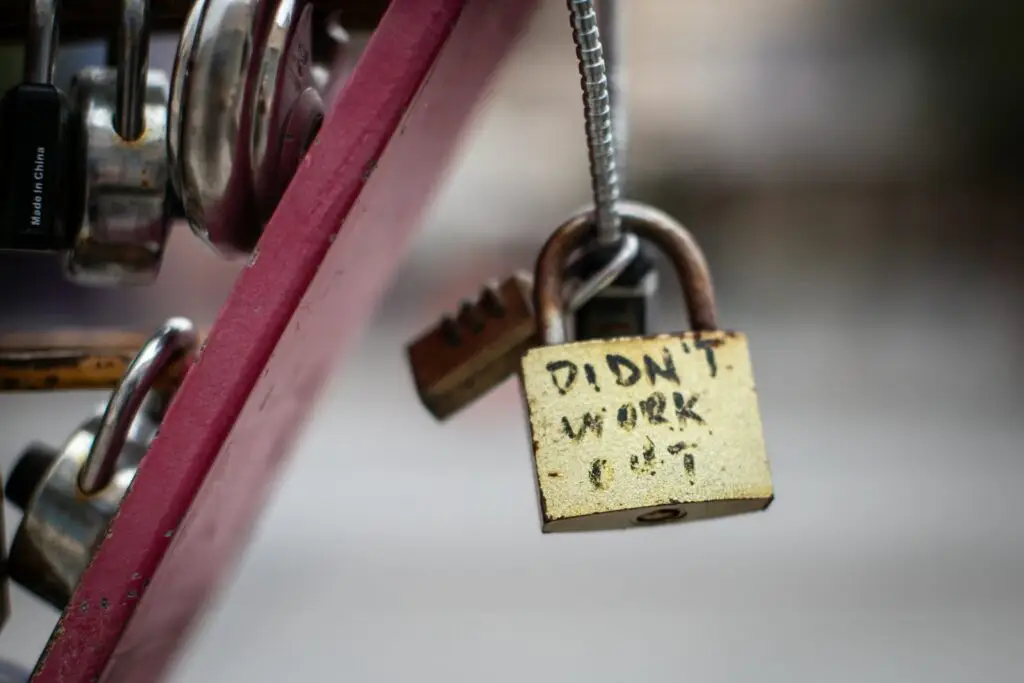Change is an inevitable part of life, whether we like it or not. Some changes are good, while others, not so much. Which brings us to the subject matter of this article: the changes that follow when a long-term relationship ends. Are they for the best, or…? The answer clearly depends on who you’re talking to.
Another question to consider is, what do you do after a breakup of a long-term relationship? To get to that answer, let’s first tease out why some long term relationships end. So let’s circle back to things that change overtime.
If you are at the end of a long-term relationship looking back through a rear-view mirror, there may be a red flag or two now see see that were present in your relationship right from the start. What I’m referring to are the things that you overlooked or swept under the rug. Perhaps at the time, these were things weren’t considered that important, or you believed they would somehow go away with time. Except, these things were important and they didn’t go away.
Once a long-term relationship ends, many people realize that what you once believed was a good thing didn’t turn out that way down the road. To be fair, few of us enter a committed relationship knowing full well that it is a horrible idea. It’s just being in love tends to overshadow issues that should have been given more attention. Here’s how things unfold:
Early on, life was good, and you and your partner appeared to be on the same page. Together, you shared your hopes and dreams for the future. But over time, things started to slide. Those long-buried red flags started to wave, and then sometime later, your relationship started going off the rails. It’s true that many relationships can be reoriented, but for others, one or both partners realize there is no pathway back.
This brings us to breakups in a long-term relationship. What then?
When a Long-Term Relationship Ends
A breakup following a longterm relationship can be highly challenging. No kidding!
After spending years together, you’ve collected lots of memories, experiences, perhaps a kid or two, and a ton of stuff. The end of a significant relationship can bring about a whirlwind of emotions, a sense of uncertainty and loss, and worry about the future.
It’s normal to feel overwhelmed and unsure of how to move forward. For many, the ability to even think straight can be exhausting. However, it’s important to remember that this difficult time will pass and with it comes healing and growth.

The Impact When a Long-Term Relationship Ends
When a long-term relationship ends, every aspect of your life takes a huge hit. From your daily routines like doing laundry, lawn care or carpooling to your future plans like trips, financial goals or retirement, a breakup can leave you feeling lost and emotionally fragile. You may feel sad, angry, confused, and even relieved all at the same time.
Everyone’s response to a breakup is unique, and there is no right or wrong way to feel.
Whatever emotions you feel, let yourself grieve the loss of your longterm relationship your way. Avoiding or stuffing these feelings will only prolong the healing process. Reach out to friends, family, or a therapist if you feel the need to.

5 Ways to Let Go and Move Forward After a Long-Term Relationship Ends
Letting go after a long-term relationship ends takes time and patience. Unraveling and disconnecting from the emotional, physical, social and financial attachments to your ex-partner doesn’t happen overnight. Part of the path to healing involves redefining your identity outside of a long term relationship one step at a time.
One of the most difficult hurdles to overcome is no longer viewing yourself as a spouse or partner but instead, as an individual. Just yourself! Think about that for a minute. You may be surprised to realize how much of your personal identity you gave away in your relationship.
Here are some strategies to help you navigate this challenging transition:
Focus on Self-Care
Prioritizing self-care during this period of change is not just beneficial but essential for personal well-being and growth. When you dedicate time to nurture yourself, you re-establish your autonomy and identity. Engaging in activities that bring comfort and joy, such as spending time in nature, practicing yoga, or immersing yourself in a favorite hobby, offers vital moments of respite and rejuvenation. These activities not only provide immediate pleasure but are also great ways to maintain your emotional and physical health.
Caring for your physical and emotional well-being after a long-term relationship ends offers more than temporary relief; it builds a foundation of strength and resilience. By taking care of your needs, you build inner resources that will help you to navigate challenges more effectively. Self-nurturing fosters a sense of empowerment and clarity, and makes it easier to face uncertainties and move forward with confidence. Investing in self-care is not just a luxury; it’s a purposeful way to promote personal growth and adapt to all life’s changes with grace and strength.
Rediscover Your Passions
When a long-term relationship ends, rediscovering your passions can be a powerful step toward healing and redefining yourself. As I said previously, after a breakup, it’s common to realize how much of yourself may have been sidelined in the process. The hobbies, interests, and dreams that once brought you joy may have faded into the background in favor of couple or family things.
Reconnecting with those lost parts of yourself—or discovering entirely new ones—can help you rebuild a life that feels meaningful and in sync with who you are now. Whether it’s painting, writing, cooking, learning a new language, or diving into volunteer work, these activities and others can ground you and remind you of your uniqueness.
Investing time in your passions can reboot a sense of purpose that is all your own. It shifts the focus from what was lost to what can be. Taking part in meaningful activities helps reinforce your identity outside of any relationship dynamic. It will give you a renewed sense of “me” that isn’t defined by someone else.
It’s not just about keeping busy—it’s about creating a life that excites and sustains you after a long-term relationship ends. As you uncover these parts of yourself that have always been there, you’ll probably find that you have increased confidence, joy, and even new connections.

Cultivate a Supportive Network
After a long-term relationship ends, cultivating a supportive network becomes crucial for emotional healing and resilience. Surrounding yourself with good people, and by that I mean individuals who can offer empathy, encouragement, and companionship, is invaluable.
Having someone to talk to who can listen without judging can make a world of difference, as it provides a safe space to express feelings and thoughts, validating your experience and helping to reaffirm your self-worth during a challenging time. Here are some options for you to think about:
- Friends and Family – They play a pivotal role in providing immediate emotional support. They can offer comforting words, a hug, a cup of coffee or distractions during the upheaval of a breakup. Their familiarity and unconditional care can take the edge off the loneliness and isolation that often accompanies such transitions.
- Support Groups – These can become a community composed of people who come with a shared purpose. As a group, it can offer guidance and solidarity based on shared experiences of those who walk a similar path as you..
- Professional Counseling – It offers a structured and tailored guidance to help you navigate complex emotions, develop coping strategies, and foster personal growth during this period of adjustment.
The above examples can form a network of care that strengthens your resilience and facilitates healing after a breakup.
Reflect and Learn
After a long-term relationship ends, take some time to reflect on what the relationship meant to you. You’ll find it can be both painful and enlightening. At first, it may not be easy to gain perspective, especially when emotions are still raw. However, as time passes and you begin to look at your relationship from the outside-in, you’ll find yourself seeing the relationship—and your role in it—with a new set of eyes.
Being able to look back on your relationship in this way will help you to identify patterns, recognize red flags that were overlooked, and develop a better sense of your emotional responses and needs. The purpose of self-reflection is not about blaming (either yourself or your ex-partner), but rather about understanding the dynamic of that relationship so that you can grow from the experience.
You’ll find that reflecting on the relationship and yourself while you were in it often leads to meaningful personal growth. When you uncover the lessons learned, you come away with a deeper sense of who you are and what you want—and don’t want—in future relationships.
Most importantly, you may become aware of how you’ve changed, how you’ve become stronger or more self-aware, and tuned into what behaviors or beliefs no longer serve you. These insights not only help with emotional healing, but also provide a foundation for healthier connections moving forward. By identifying and actively working to break old patterns, you give yourself the best possible chance to build more fulfilling and emotionally balanced relationships in the future.

Thriving After a Long-Term Relationship Ends
You may be wondering when I’ll finally get to the point of this article. Well, here we are, so let’s explore the five steps to thriving after a long-term relationship ends.
1. Set New Goals
When a long-term relationship ends, it’s common to feel unmoored, drifting aimlessly in a sea of confusion and grief. For many coming out of a long term relationship there’s a realization that the future you once envisioned has now gone up in smoke. But once the dust starts to settle, this period of change can actually become a great opportunity to make plans that you may never have imagined otherwise when you were part of a couple.
Setting new personal and professional goals is an excellent way to move forward. The goals you create don’t have to be large-scale or life-altering right off the start—you can start small and gradually develop them further as your confidence returns. The important thing to remember is these new goals belong to you alone and they reflect who you are now, not who you were in the context of your past relationship. You will also likely find that after a long-term relationship ends, your priorities, values, and aspirations may have shifted. So your goals should stem from that new foundation.
Whether it’s going back to school, switching careers, picking up a passion project that you put on hold, or simply exploring a hobby that brings you joy, these forward-thinking choices can bring a renewed sense of purpose, satisfaction and pleasure.
2. Practice Gratitude
After a breakup, feeling gratitude is likely the last thing on your mind. The fallout after a long-term relationship ends tends to overshadow most of the good things that still exist in your life. Interestingly, though, when you intentionally practice gratitude—especially during difficult times—it can be a powerful tool for healing. This doesn’t mean you have to become a “PollyAnna” or pretending everything is fine or minimizing your pain.
Instead, it’s about acknowledging the small, steady sources of comfort and strength that are still present. Maybe it’s a supportive friend who checks in regularly, a morning walk that clears your head, or even the fact that you’re showing up for yourself day after day. Recognizing and appreciating these moments can create the emotional space that is necessary for hope and healing.
Gratitude also helps shift your focus from what you’ve lost to what you still have, and this shift is key to rebuilding a sense of emotional stability. It can strengthen your resilience by reminding you that you’re not alone and that you do have resources, both internal and external, to get through this.
Over time, gratitude becomes more than just a coping mechanism; it becomes a mindset that helps you open your eyes to new possibilities and approach the future with optimism.
3. Explore New Opportunities
Change can feel overwhelming, especially when it’s the result of a breakup that blows the lid off your sense of stability and routine. But somewhere within that conundrum of disruption is an invitation to explore new opportunities that might never have crossed your path otherwise.
When a long-term relationship ends, it creates space—emotionally, mentally, and sometimes even physically—for new things to take root. This is the perfect time to step outside your comfort zone and say yes to experiences that ignite curiosity or excitement. You don’t have to have it all figured out—just trying something unfamiliar can help you reconnect with yourself in a fresh, empowering way.
Whether it’s planning a trip, joining a new group, learning a skill, or saying yes to a spur of the moment invitation, each one of these is a step into something. In turn, exploring new opportunities helps build confidence and expand your sense of what’s possible. Through these opportunities you’ll probably meet new like-minded people and form a network outside of your former relationship.
The key is to stay open and not overthink it. By actively seeking out and embracing new opportunities, you won’t be marking time—you’re taking important steps to create a life that reflects who you are becoming, not who you used to be.
4. Establish Healthy Boundaries
After a breakup, it’s essential to create space that protects your emotional well-being, and that starts with setting healthy boundaries. It begins with being honest with yourself about what triggers emotional distress in you. And just as important, it means that you consciously avoid situations that may cause unnecessary pain.
Whether it’s a late-night text from your ex, you’re constantly checking their social media, or you’re saying yes to events you’re not emotionally ready for or disinterested in, boundaries serve as a buffer between you and experiences that do little for your emotional well-being. Be clear, this isn’t about being cold, nasty, or bitter—it’s about paying attention to your need to heal, grow, and protect your peace.
Healthy boundaries can take many forms. You might decide to limit or pause communication with your ex by phone, text, DMs, or email. This is especially true if staying in touch causes you confusion or prolongs emotional attachment. At the same time, you may also need to rethink connections with mutual friends—some may continue to be supportive, while others might unintentionally say or do things that cause you distress. Just as healthy boundaries are essential, so is pouring energy into people, activities, and spaces that support your personal growth.
It might feel a bit weird at first—especially if you’re used to being accommodating or avoiding conflict—but the long-term benefits of setting healthy boundaries are worth it. Don’t think of boundaries as walls. Instead, think of them as self-respect in action, helping you reclaim control over your life and relationships as you move forward.
5. Seek Professional Assistance
If you find yourself struggling to cope with the aftermath of a breakup, seeking professional help from a therapist or counselor can offer valuable support and guidance. Struggling can include any other the following signs:
- difficulty sleeping or sleeping too much
- difficulty concentrating
- overwhelming feelings of sadness
- inability to follow through with daily routines and responsibilities.
Professional mental health support can provide the tools and insights needed to get over the hump of this challenging time with resilience, increased confidence and a sense of self-compassion.
Wrapping Up Thrive After a Long-Term Relationship Ends
While the end of a long-term relationship can be as emotionally draining as it is challenging, it also presents an opportunity for personal growth, self-discovery, and pursuing a fulfilling life on your own terms. How nice is that?
Moving forward starts by pushing through the breakup – NOT against it!
By embracing change, practicing self-care, and cultivating a positive mindset, you can navigate this transition with resilience and emerge stronger and more empowered.


